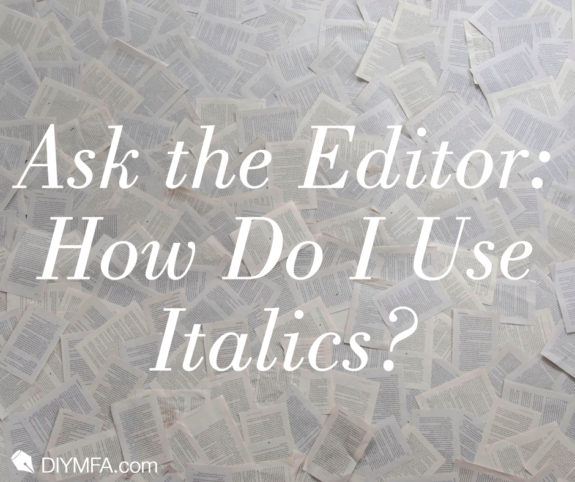We finally have a question for the editor! It only took a few months for someone to write to me, but here it is, and I’d like to take a moment to celebrate. And apparently, when it rains it really does pour because I actually received TWO questions about the same topic: italics. So—celebration now over—let’s get down to business.
Question 1
I have a question for the editor about when to use italics and when it might be better to use something else, like a different font. I do use italics for some internal dialogue. Here’s the question bit—
My telepathic character is possessed by music. Music is like a character. Sometimes it speaks to him with short one- or two-word sentences like “Play” or “Play Beethoven.” Should this be italicized or would something else like a different font or all caps be better? Right now, I have it italicized without quotations but I’m afraid it looks like more internalization.
Do my other uses of italics or not italics make sense, or should I do them differently?
Signed,
Italic-ly Confused
Question 2
I realized that I might not be using the best way to express a character’s inner thoughts. I’m pasting in a passage here that I think works with the italics but I’m not sure:
Maisie’s right, Picka thought. It is strange Ramone’s seeds were in a line along his body, not swirled around in the wind like the leaves and branches. And…no other Hatch peppers were shredded by hail in the thunderstorm. Picka’s skin tingled like that time lightning struck too close. He couldn’t put together how, but he just knew right down to his seeds that Ramone’s death wasn’t an accident.
“Who would do this to Ramone, and why? How will I find out the truth?”
“Why don’t you ask your bird friend to help?”
Picka yelped and nearly fell off his stem. He did not know he had been talking out loud.
I can’t think of another way to show when Picka is thinking to himself and when he is talking out loud without realizing it. Any insight is appreciated!
Signed,
I Dream in Italics
Editor’s Answer:
Here’s the thing about italics—they have many uses, but it is also very easy to overuse them.
In the first question, there are quite a few options when it comes to the way this author can format their manuscript and use italics. My main piece of advice is to use italics for one thing and stick with that. So, if this author uses italics to indicate inner thoughts, I recommend they not use them for the disembodied Music character. In this case, choosing all capitals or a different font could work well. For a good example of how to pull this off, read through Terry Pratchett’s book Mort, where the character Death speaks in all caps. In the end, there’s no hard and fast rule here, it’s all a stylistic choice.
In the second question, this author is on the right track with their usage. Juxtaposing the italics against regular looking dialogue will give the reader a clear indication of when the character is thinking versus speaking. However, there are alternatives to indicating inner thoughts with italics, such as the lesser-known point of view known as Deep POV. This increasingly popular style allows you to take out all the pesky “he thought” or “she felt” kind of stuff because you assume the reader can determine this for themselves (i.e. without formatting to clue them in).
If they were trying for Deep POV, this author might rewrite this passage into…
Picka’s mind raced through the evidence. Ramone’s seeds were in a line along his body, not swirled around in the wind like the leaves and branches. Maybe Maisie was right. That was certainly strange considering no other Hatch peppers were even minorly damaged by hail in the thunderstorm. Picka’s skin tingled like that time lightning struck too close…
Here, we understand that Picka is thinking because we are given the clue that his mind was racing. It conveys the same information and feelings but doesn’t rely on formatting to tell the reader what’s going on.
In reality, italics are a tool with many uses. They can add emphasis, indicate inner thoughts, characterize disembodied voices, or even be taken out altogether. If in doubt, use the “less is more” philosophy. It’s possible a future agent, editor, or publisher will remove your extraneous italics anyway. In the end, the clarity and quality of your writing should not rely solely on the formatting. Choose your usage and stick to it. You’ll be italicizing like a pro in no time!
How to “Ask the Editor”
Have a burning question for the editor? Just ask!
Jeanette is always accepting questions for our Ask the Editor column. Send a few paragraphs introducing yourself and your question to Jeanette@DIYMFA.com. You can also send up to five pages of your WIP for critique. We do our best to answer every question we receive, so keep an eye out for our next Ask the Editor article. Your question may be featured!

Jeanette the Writer is an editor, coach, and freelance writer who wants to help others demolish their editing fears and finish their manuscript. As a former scuba instructor turned entrepreneur, Jeanette knows about putting in the hard work to pursue your passions. She has worked with authors, speakers, coaches, and entrepreneurs—empowering them with the right mindset, knowledge, and tools to help them tackle their editing goals. You can learn more about Jeanette by visiting JeanetteTheWriter.com.







